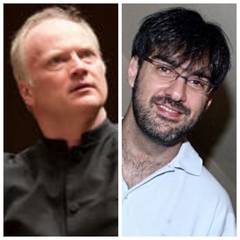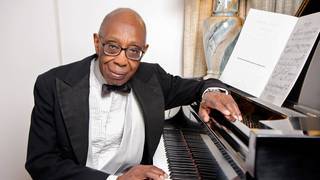|
Back
Violin? Violence! New York
Wu Tsai Theatre, David Geffen Hall
05/04/2023 - & May 5*, 6, 2023
Dmitri Shostakovich: Violin Concerto No. 1, Op. 77/99
George Walker: Sinfonia No. 1
Ottorino Respighi: Feste romane
Leonidas Kavakos (Violin)
New York Philharmonic Orchestra, Gianandrea Noseda (Conductor)

G. Noseda/L. Kavakos (© Tony Hitchcock)
“Respighi’s brilliant but meretricious ‘Feste Romane’ is good clean musical fun.”
Virgil Thomson
“I would like to be known as an opera composer, but I’m afraid the ‘Roman Trilogy’ will have made me famous.”
Ottorino Respighi
<
With its pick of the world’s greatest conductors at its helm, the New York Philharmonic last night chose one of the most dynamic on the world’s podia: Gianandrea Noseda looks the part and, with the right music, getting the results needed.
Obviously Respighi’s Feste romane was caviar–or Umbrian truffles–for Mr. Noseda. George Walker’s First Sinfonia had the mix of Stravinsky and Paul Creston. As for the Shostakovich Violin Concerto, all that he needed was the equally dynamic Leonidas Kavakos.
Just as the Concerto is equally haunting and energizing, Mr. Kavakos has shown himself to be both consummate artist and exciting fiddler. Tackling the Shostakovich couldn’t have been easy, since every note demands knowledge of the composer’s cryptic language and the depths of mood.
Some feel that this work rivals the Berg Violin Concerto (also mastered by Mr. Kavakos) as the greatest of the 20th Century. Both are pictorial, both break the usual concerto structure.
Mr. Kavakos’ first challenge last night was getting through that desolate first movement, retaining the tension and starting the emotional trajectory. That and the following scherzo were well‑handled. Yet the real tests are the passacaglia and long long cadenza. Here, the soloist performed with hard bowing, with almost super‑human intensity.
My first acquaintance with the work was with the Oistrakh American recording, which was technically fine, yet somehow distant. Leonidas Kavakos was anything but distant. This was up‑front playing, with phrasing and feeling well befitting such a fierce masterpiece.

G. Walker
The one unfamiliar work came from the iconoclastic George Walker, who died five years ago after a productive 86 years. A piano prodigy who entered Oberlin at the age of 14, Mr. Walker was the first African-American accepted at Curtis, the first to win a Pulitzer Prize.
He was also an extremely eclectic composer. Yes, he employed Black methods–blues, jazz, spirituals. Yet he rarely wrote Black music itself. He wrote atonally, dodecaphonically and with all the resources of American mid‑Century music.
This two‑movement Sinfonia started with a Stravinskyan jolt, then extended with a brassy symphonic touch, leading to a strange second movement. This was melodic, yes. But Walker used a large percussion section, mainly as punctuation. But equally with close jazzy notes added to the fascinating blend.
It was hardly fair to follow George Walker’s Sinfonia with Ottorino Respighi’s Roman Festivals. But very fair to us journalistic hacks.
Walker’s work was suitably brassy, suitable percussive, rather winning. Respighi, though, wealthy, famous and massively talented, decided to a) celebrate ancient Rome’s extravaganzas; b) pay homage to Benito Mussolini; and c) attempt to give the loudest possible music to the world.
Since then, he has been outdone by Revueltas, Maderna and the transcription of Scriabin’s Universe Symphony etc etc. But he accomplished his efforts.
Which makes life easier for us word‑drudges. With a mighty orchestra like the New York Philharmonic, a viscerally dramatic conductor like the Milan‑born Gianandrea Noseda, and a composer who, when necessary, ate, drank, strolled with and fornicated with fffff’s, we can simply sit and literally enjoy the show.
We could enjoy the band of trumpets replicating Roman buccine (wrong instrument: we now know it had a good range like a trombone or French horn), the German chorale supposedly for Italian pilgrims, the lively scherzo and...well, we had to salivate when those dozen‑odd bass‑drummers/military drummer/ timpanist/bell/gong/wind‑block/chime/cymbal players stood up like a congregation for a coronation...
...and relish the reverberations.
Mind you, Respighi could be one of the most delicate and tasteful orchestrators of the last century. Yet with the finish of Feste romane, we knew that he had hoarded a world of sound. He enjoyed writing it, and only a fool would look for an excess of profundity.
Harry Rolnick
|